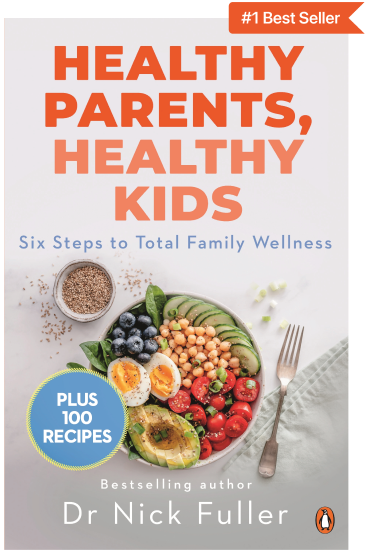Picky Eater Vs Problem Feeder

Dr Nick Fuller
Leading Obesity Expert at the University of Sydney and founder of Interval Weight Loss.

Picky eaters have their preferences—maybe they’re not crazy about veggies but are all about fruits, pasta, and other goodies. They might be fussy, but they still have a decent variety in their diet.
Problem feeders, on the other hand, take pickiness to the next level. They might stick to fewer than 20 foods and often refuse to try anything new. Textures, colours, and smells can become major roadblocks, making mealtime a real challenge.
This guide will help you understand these differences and provide you with strategies to handle both types of eaters. Whether you're dealing with a picky eater needing a bit of encouragement or a problem feeder requiring more tailored approaches, we’ve got tips to make mealtime smoother.
Family Dinners Made Simple – Get Your Essential Guide Right Away!
Feeling like dinner is just another task rather than a fun gathering? Time to turn things around with Healthy Parents, Healthy Kids by Dr Nick Fuller! This handy guide from one of Australia’s top experts on childhood obesity is packed with fun tips and practical advice to handle fussy eaters and whip up dishes everyone will love.
Put an end to mealtime battles and embrace happy, nutritious meals. Get your copy of Healthy Parents, Healthy Kids today and transform mealtime into a joy-filled occasion!
What is Picky Eating?
Picky eating refers to a child’s selective eating habits, where they prefer a limited variety of foods and frequently refuse to try new dishes. It’s a common phase, especially in toddlers and young kids, but it can sometimes stick around longer than you’d like.
Picky eaters have their go-to favourites—soft over crunchy, bland over spicy, or just a specific colour on their plate. Knowing their preferences helps you prepare meals that are both appealing and nutritious.
In addition, new foods can be a big 'no thanks' for picky eaters. They might stick to their ‘safe’ foods and need lots of chances to try new things. Patience is key here; repeated exposure can help expand their taste buds.
While picky eating is usually a phase, it’s worth keeping an eye on. A diet lacking in variety might miss out on important vitamins and minerals. If your child avoids fruits and veggies, make sure to find alternatives that still pack a nutritional punch. Check out our Education section at Feeding Fussy Kids for some great ideas!
Picky eating can also stir up some social stress, especially during family meals or parties. Your child might feel uneasy about the food, which can take away from the fun of dining together.
Here’s the game plan: introduce new foods slowly, keep mealtime stress-free, and get your child involved in cooking. This can make them more curious and willing to try new dishes.
So, let’s turn mealtime into a fun and positive experience, helping your little one explore new tastes and enjoy their food!
What is Problem Feeding?
Problem feeding is like picky eating's more intense sibling. It’s less common but can be a real challenge. Kids with problem feeding have an ultra-restricted diet, often sticking to fewer than 20 foods and sometimes even giving up previously liked foods for good. This can lead to some serious nutritional gaps and might need a helping hand from health pros.
These kiddos might refuse to eat, grumble about the menu, and even play with their food like it's a toy. They also often spend less time actually chewing their meals.
With such limited eating habits, problem feeders are at risk for serious nutritional deficiencies and development delays. They might need a special eating plan and possibly some extra supplements to keep them on track.
If problem feeding is part of your world, it’s time to consult with a paediatrician, nutritionist, or feeding specialist. They’ll help you create a plan to ensure your child’s health and well-being.
How to Identify If Your Kid is a Picky Eater or Problem Feeder
Figuring out whether your child is a picky eater or a problem feeder can make all the difference when it comes to meal planning, nutrition, and even behaviour. Here’s a quick guide to help you tell them apart:
Variety in Diet
Start by checking out what’s on your kid’s plate. Picky eaters usually have a few favourites but are open to trying new things, especially if they see others enjoying them. They might stick to certain textures or types but still eat a broader range than problem feeders.
Problem feeders, however, are super selective, often sticking to specific brands or types of food, and they rarely try anything new. If a food gets crossed off their list, it might never make a comeback.
Reaction to New Foods
Watch how your child reacts when you introduce new foods. Picky eaters might hesitate or refuse at first but can often be persuaded to give it a go, especially with a little patience and repeated exposure. Problem feeders, on the other hand, might have major meltdowns, from crying and tantrums to gagging or even vomiting. These intense reactions are a sign of a deeper issue than just pickiness.
Physical and Emotional Signs
Keep an eye out for physical and emotional clues. Problem feeders might struggle with weight gain, nutrition, and growth, and they often show significant anxiety or distress around mealtimes. Picky eaters usually don’t show such extreme signs. If you notice these issues, it might mean there's a more complex feeding challenge at play.
If you’re unsure or worried about your child’s growth or emotional well-being related to eating, it’s a good idea to consult with a pro. A paediatrician can check overall health, while a feeding specialist, like a dietitian or occupational therapist, can offer tailored advice and strategies.
For more support, check out the Resources at Feeding Fussy Kids and get your little one on the path to happy, healthy meals!
How to Deal with a Picky Eater
With the right approach, you can turn mealtime into a fun adventure! Here’s how to make eating a positive experience and help your child discover new foods without the fuss:
Introduce New Foods
Mixing new foods with familiar favourites is a great way to ease your child into trying something new. For example, serve a small piece of a new veggie next to their beloved pasta. This way, they can explore new flavours at their own pace, without feeling overwhelmed. It’s all about making new foods less intimidating and more like a tasty bonus.
Looking to spice up your kid’s meals and make them more adventurous? Click here to see our collection of kid-friendly recipes that are easy to make and packed with fun flavours.
Family Meal Planning
Get your child involved in meal planning and cooking to spark their interest in new foods. Let them pick a new item to try each week and help with prep. Handling ingredients and seeing how meals come together can make them more curious and excited about trying new things.
Positive Reinforcement
Encouragement goes a long way! Celebrate their efforts to try new foods with compliments and small rewards. Focus on their willingness to try rather than whether they like the food. This positive approach helps build their confidence and makes trying new foods more appealing.
Set a Routine
A regular meal and snack schedule can make eating more predictable and less stressful. Consistent timing helps regulate hunger and creates a calming routine. A pleasant dining environment also makes mealtimes more enjoyable and less about battles.
Seek Professional Guidance
If picky eating persists or if you’re worried about nutrition or behaviour, consulting a pro might be helpful. A nutritionist or paediatric dietitian can ensure your child’s diet is balanced and offer tailored advice. Getting expert support can make a big difference in managing picky eating and keeping your child healthy and happy.
How to Deal with a Problem Feeder
Now, if you’re dealing with problem feeding, here’s a practical guide to help you and your child navigate this journey:
Structured Eating Plans
Work with a dietitian to create a meal plan tailored to your child’s needs. These plans should take into account your child's likes, dislikes, and any special dietary requirements. You’ll get a detailed schedule, portion sizes, and tips on how to introduce new foods gradually and gently. Sometimes, supplements might be needed to fill in any nutritional gaps, and your dietitian will help you with that too.
Therapy Options
If sensory or physical challenges are part of the problem, therapies can make a big difference. Occupational therapists can help your child get more comfortable with different food textures, smells, and tastes.
Parental Education and Support
Being a parent of a child with feeding issues can be tough, but you’re not alone. Join support groups or workshops to learn strategies and get advice from other parents in the same boat.
Monitoring Progress
Keep up with regular check-ups to track your child’s growth and make sure the feeding plan is working. These appointments are a chance to celebrate milestones, address any new challenges, and tweak the plan as needed.
Final Thoughts
Dealing with your child’s eating habits can feel like a big task, but understanding whether they’re a picky eater or a problem feeder is a great place to start. Knowing which category fits your child helps you choose the best strategies to expand their diet and ease mealtime stress.
Whether you’re introducing new foods gradually at home or getting professional advice for more serious issues, the right approach can make a big difference in your child’s nutrition and overall well-being. And don’t forget, there’s support available to guide you through these challenges, ensuring your child grows up healthy and happy.
Register to have updates on cutting-edge strategies, expert advice, exclusive offers, and continuous support sent right to your email!
Meet Dr Nick Fuller
My Story
As a father, I know first-hand that raising healthy and happy children is tricky. Children are fussy, particularly at the end of the day when they are shattered. We also live in a society where companies seek to profit from what we feed our kids; incorrect and damaging advice is pushed on us and marketed towards our children, and we have no time.
But with these recipes and resources, you and your children can enjoy simple and well-founded food and lifestyle choices for lifelong health.

About Dr Nick Fuller
Dr Nick Fuller is the founder of Interval Weight Loss and is a leading obesity expert at the University of Sydney with a Ph.D. in Obesity Treatment. Dr Fuller is also the author of three best-selling books and his work been published in top ranked journals in the medical field, including JAMA, Lancet and American Journal of Clinical Nutrition.
